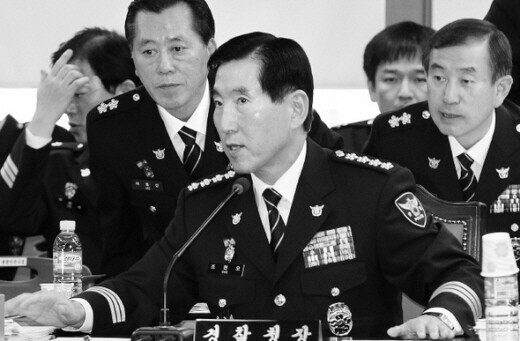hankyoreh
Links to other country sites 다른 나라 사이트 링크
Former KPNA commissioner rejected sound cannon amid safety concerns

By Lim Ji-sun
A Democratic Party lawmaker has stated that former Korean National Police Agency (KNPA) Commissioner Kang Hee-rak refused to introduce a long-range acoustic device (LRAD) when then-Seoul Metropolitan Police Agency chief Cho Hyun-oh first proposed it. Kang cited the fact that it was “lethal to the human body” as his reason for refusing it. Led by current Commissioner Cho, the KPNA is now pursuing plans to introduce the LRAD, also called a “sound cannon,” to disperse protests and demonstrations.
During a National Assembly audit session held at the KNPA in the Migeun neighborhood of Seoul’s Seodaemun District on Thursday, DP Lawmaker Jang Se-hwan, a member of the National Assembly’s Public Administration and Security Committee, described Kang’s response to Cho’s proposal in May.
Jang said, “Given that the standard for sound regulation in the Assembly and Demonstration Act is 80 decibels and this device has a maximum output of 152 decibels, which could be fatal to the human body, we cannot adopt it for use.”
Jang said that he confirmed this quote directly through a telephone conversation with Kang.
“At the time, Cho asked, ‘What are we going to do if the protesters go to the Cheong Wa Dae?’ and Kang refused to allow the use of the device, saying, ‘In that kind of situation, the people of South Korea would understand if we used tear gas,’” Jang added.
In response to Jang’s remarks, Cho said that Kang “did not agree, but I never heard that he definitely opposed it.”
Cho added, “I myself have experienced the sound set at the maximum output of 152 db from a distance of 10 meters, and there was no problem with safety.”
Cho went on to say, “We definitely need the long-range acoustic device to suppress protests.”
Jang was not the only individual testifying to Kang’s opposition to the device’s introduction over safety issues. During an interview with the Hankyoreh on Tuesday, Dr. Lee Sin-lyul of SL Audio Lab, developer of the Korean LRAD, recounted that at a police test of the device in May, Cho insisted on having it set into attack mode and turned up louder.
“Kang Hee-rak had come out the site, and after hearing the sound in attack mode only briefly, he waved his hand, saying, ‘This won’t do, that’s enough,’ and left the site,” Lee recalled. “We were ready to give Kang an explanation of the device, and after he left so abruptly, we were left standing around not knowing what to do.”
After the commissioner’s objections stymied the cannon’s introduction, police reportedly pursued the introduction of a “broadcast vehicle loudspeaker” for the Dongdaemun Mobile Police Corps. Lee subsequently went to work developing a device with a lower output that could be attached to a vehicle. However, when Cho took office as commissioner on Aug. 30, Lee recounted, the situation changed once again and the police again pursued introduction of the LRAD.
At the time of bidding, the KNPA also presented requirements for a device matching the specifications and sketch of a specific U.S. product. Since this prevented all but the maker of the product in question from bidding, this suggests that the agency essentially sought to eliminate South Korean companies from the bidding and introduce a U.S. LRAD through a no-bid contract.
Please direct questions or comments to [englishhani@hani.co.kr]
Editorial・opinion
![[Column] Has Korea, too, crossed the Rubicon on China? [Column] Has Korea, too, crossed the Rubicon on China?](https://flexible.img.hani.co.kr/flexible/normal/500/300/imgdb/original/2024/0419/9317135153409185.jpg) [Column] Has Korea, too, crossed the Rubicon on China?
[Column] Has Korea, too, crossed the Rubicon on China?![[Correspondent’s column] In Japan’s alliance with US, echoes of its past alliances with UK [Correspondent’s column] In Japan’s alliance with US, echoes of its past alliances with UK](https://flexible.img.hani.co.kr/flexible/normal/500/300/imgdb/original/2024/0419/2317135166563519.jpg) [Correspondent’s column] In Japan’s alliance with US, echoes of its past alliances with UK
[Correspondent’s column] In Japan’s alliance with US, echoes of its past alliances with UK- [Editorial] Does Yoon think the Korean public is wrong?
- [Editorial] As it bolsters its alliance with US, Japan must be accountable for past
- [Guest essay] Amending the Constitution is Yoon’s key to leaving office in public’s good graces
- [Editorial] 10 years on, lessons of Sewol tragedy must never be forgotten
- [Column] A death blow to Korea’s prosecutor politics
- [Correspondent’s column] The US and the end of Japanese pacifism
- [Guest essay] How Korea turned its trainee doctors into monsters
- [Guest essay] As someone who helped forge Seoul-Moscow ties, their status today troubles me
Most viewed articles
- 1[Column] The clock is ticking for Korea’s first lady
- 2[Correspondent’s column] In Japan’s alliance with US, echoes of its past alliances with UK
- 3After 2 months of delayed, denied medical care, Koreans worry worst may be yet to come
- 4[Column] Has Korea, too, crossed the Rubicon on China?
- 5[Editorial] When the choice is kids or career, Korea will never overcome birth rate woes
- 6Samsung barricades office as unionized workers strike for better conditions
- 7US exploring options for monitoring N. Korean sanctions beyond UN, says envoy
- 8US overtakes China as Korea’s top export market, prompting trade sanction jitters
- 9[Photo] Smile ambassador, you’re on camera
- 10Hong Se-hwa, voice for tolerance whose memoir of exile touched a chord, dies at 76